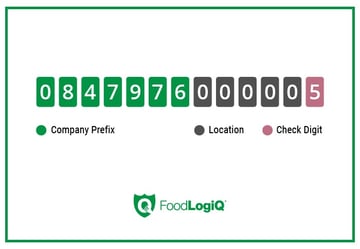We just wrapped our seventh annual Virtual reCONNECT conference, which brought together industry leaders and experts to discuss the future of food supply chain technology, where over 300 food industry professionals raised their hands to be included in the conversation.
Couldn’t make it? You can still access all of the sessions on-demand and do Virtual reCONNECT on your own schedule. In the meantime, we have you covered with the event's biggest takeaways right here:
Data Quality is the Foundation of Modern Food Supply Chains
Discussing modernization in any industry isn't possible without discussing data and its impact, and data was central to many reCONNECT sessions this year. Whether the data relates to supply efficiency or FSMA 204 compliance, the message was universally clear: quality data is non-negotiable in today's food industry.
Ryan Richard, Vice President of Partner Engagement at GS1 US, emphasized the importance of data standardization in his session on how it can whip your supply chain into shape. "As a supplier, as a retailer, as an operator, you need to invest now in ensuring that your data is clean and up to par or none of these systems are going to work together."

In the FSMA 204: Preparing for the Compliance Deadline session moderated by Trustwell's own Vice President of Supply Chain Strategy & Insights — Julie McGill — Mike Rose, Director of Food Safety at McLane Co. reinforced this point: "If we have a system in place that's sending data, but it's not accurate at the end of the day, do we really have a system at all? No, we don't."
The importance of quality data becomes immediately evident in critical situations, and when you have it, the benefits are obvious, Rose went on to say: "The ability to identify the specific field date time that a product came from... we can reduce the amount of product that's getting destroyed or that's affected by this outcome. We can pinpoint the exact information that we need in order to eliminate those risks to the public as a whole." This focus on data quality isn't just about compliance—it's about enabling the future of food safety and supply chain efficiency.
AI & Automation are Transforming Every Aspect of the Food Industry
The conference revealed how artificial intelligence is becoming integral to food supply chain operations. Todd Dolinsky, Trustwell's Chief Product Officer, cut straight to the chase. "Every facet of the food industry is going to be influenced by AI solutions. The technology is here to stay," he told VP of Marketing Lydia Adams during their discussion, Success Stories: Use Cases for AI in the Food Industry.

Jerry Gupta, Head of Insurance & AI Products at Armilla AI, outlined the breadth of AI applications: "Now we are seeing across the board, you know, crop planting, distribution, logistics... It could be as simple as predicting when to send a cargo ship to which port because that's when the crop is gonna get there. It could be how to route your perishables delivery so they don't get caught up in storm cycles."
Among those applications and potential use cases, food safety emerged as a crucial area for innovation. Dr. Ben Miller, EVP of Scientific and Regulatory Affairs at The Acheson Group, highlighted practical applications: "When we think about equipment and tasks that humans often do, can we automate those and make those better and more reliable and more efficient? We're seeing more widespread adoption of things like visual identification of foreign materials in food manufacturing settings or starting to get to predictive analytics, looking at when equipment might fail."
Gupta also emphasized the strategic importance of focusing AI on safety: "I think the greatest innovation is probably gonna happen in food safety and access. It's important to focus not as much on the shiny new toys, but on ensuring that there's robustness, safety in the system. And I think that's where AI will also play a big role."
Consumer Demand is Driving Supply Chain Transparency
Whether they knew it or not, consumers were overwhelmingly present in this year's Virtual ReCONNECT sessions. The significant shift in consumer behavior and its impact on the food supply chain was a hot topic across multiple talks. "Twenty years ago, people didn't care where their food came from... But today, a lot of consumers want to know what cow was in what field and how did that product get to market once it left the field," Richard said of today's food industry and supply chain.
This consumer interest is driving innovations in product labeling and information sharing. Modern technologies like QR codes and GS1 Digital Link enable consumers to access detailed product information instantly while simultaneously serving business needs. In Data at Our Fingertips: Consumer-led Traceability, Kwik Lok's Director of Business Development, Chris Latta, explained how technologies like these help satisfy increased consumer appetite for information about what's on their plates. "Consumers can use their mobile device and and scan that [GS1 Digital Link] QR code and get information about that product. At the same time, it also allows point of sale to scan that QR code and treat it just like a normal 2D UPC.”

Michael Streitberger, Director of Partnerships at HowGood, an independent research company with the world's largest database of sustainability data, urged food industry leaders to lean into opportunities to measure the benefit of meeting consumer demand in his session, Integrating ESG and Sustainability into the Food Industry's Core Strategy.
"Instead of a paper label showing just the price, you might include something digitally, like a climate-friendly attribute for a certain amount of days or weeks to test whether consumers gravitate toward it or if it resonates with them. We've seen sales uplift numbers with certain attributes where there is ROI for a lot of these retailers who are quantifying which products have these impact labels."
Collaboration is Critical for Supply Chain Success
A recurring theme throughout the conference was the importance of collaboration, not just on teams or within companies but across the entire industry. Teams working to meet traceability mandates can benefit immediately from teamwork, according to Rose, who has direct experience with the initiative.
"We created a 'FSMA team'. We meet regularly, several times a week. And within those teams are separate working groups that consist of key stakeholders and subject matter experts for each particular area. Those areas include food safety, legal, IT, our WMS team, our sales team, purchasing, national accounts, operations, you name it. We're all involved in one aspect or another.”

Michael Streitberger reinforced this idea. "The more that these different brands across these different points in the value chain are collaborating and using the same data and the same language to communicate, the faster things are moving. If we're all doing this individually in silos, nothing's going to get done; we're all going to be doing different things," he said, adding that "The Earth pays the price in a certain regard" as a result.
Ryan Richard from GS1 emphasized the importance of both internal and external collaboration: "You need to collaborate with your supply chain partners both internally and externally, because you don't want to just make efficiencies within your four walls, but you want to make that across the supply chain with your trading partner. So you have to be transparent and collaborate."
The benefits of collaboration extend beyond operational efficiency to sustainability and transparency. As Streitberger noted: "Giving some of that visibility to suppliers is super important because it allows them to provide more transparency and visibility, and network effect where the more data we have, the more we can make more accurate measurements and create a plan for more regenerative outcomes in the future."
Rose summed it up succinctly: "It's not just for vendors to work together. It's not just for manufacturers to work together. It's not just for distributors together, or even for customers. It's for all of us to come together as one, figure out a solution that works for the whole supply chain."
Core Business Strategies Are Expanding to Include Sustainability & ESG
This year, the conference's emergent theme was the role of Environmental, Social, and Governance (ESG) considerations in the food industry. Many ReCONNECT session leaders and guest speakers invoked the sense that such considerations are no longer optional add-ons. Instead, these initiatives are becoming more central to business strategy, catalyzed by the introduction of regulations that require them or simply enable them.
Dr. Louise Manning, Professor of Sustainable Agri-Food Systems at University of Lincoln in the UK highlighted this in her session, End-to-end Traceability: The Path to Net Zero: "Traceability is a foundation for beginning to understand the environmental impact of your supply chain," she said, going on to highlight its use as a tool for combatting food waste.

"The use of data and digital technology is really supporting [redistribution efforts] so that food processors can identify what level of product they've got that can then be picked up and redistributed in the timescale of within its shelf life.”
Meanwhile, Streitberger's session touched on the importance of looking beyond just carbon emissions for companies, citing HowGood's processes. "We look at for every ingredient, all of the different metrics beyond carbon... how are we making a better planet with the way that we do our ag systems, make our food, sell our food."
Regulatory Compliance is Evolving from a Checkbox Exercise to a Strategic Advantage
There was a sense throughout the conference that when it comes to regulatory requirements — particularly around food safety and traceability — compliance is becoming a source of competitive advantage rather than just a necessary burden. This strategic approach to compliance is becoming increasingly important as regulations become more complex globally. As Megan Murphy noted regarding international labeling requirements, "Each country has their specific rules for labeling as well as packaging... there isn't harmonization for one global label."
The key to success lies in building robust systems and teams dedicated to compliance. As demonstrated by Mike Rose's approach: "We've kind of created what we call a FSMA team... Those areas include food safety, legal, IT, our WMS team, our sales team, purchasing, national accounts, operations, you name it. We're all involved in one aspect or another."

Moreover, compliance is increasingly tied to technological capabilities. Ryan Richard pointed out that while "FSMA rule 204 isn't prescriptive on what technology is needed to share the data... is [using a spreadsheet] really going to be sustainable as you try to share that out with the government or trading partners? You should be looking at automated solutions that you can robustly share with your trading partners if possible."
Rose's advice to other food industry leaders is to see beyond compliance obligations to the bigger picture. "[FSMA] gives all of us the opportunity to know that we as an industry are doing everything that we can to provide safe, wholesome food to our customers.To make sure we're tracing this food, to make sure we're eliminating all areas of possible errors in the supply chain. It's really an opportunity we can't afford to squander.”
Bonus ReCONNECT 2024 Takeaway: The Food Industry is at a Pivotal Moment of Transformation
Success in this new era will require clean data, smart technology implementation, transparency, collaboration, and a commitment to sustainability. As the industry continues to evolve, these six key areas will be crucial for companies looking to stay competitive and meet the changing demands of consumers and regulators alike.
Collectively, the trends we observed at ReCONNECT 2024 signal a pivotal transformation for the food industry and businesses within it. Companies that can harness new technologies, meet evolving consumer demands, and navigate changing regulations with more than compliance in mind today will differentiate themselves from competitors as the leaders of tomorrow.
Like what you see here and want to see what you missed during Tech That Connects: Modernizing Our Food Supply Chain? You can request access to all of the sessions on our event page. Want to learn more about why industry leaders partner with Trustwell for solutions that encompass everything from emerging technologies to ESG initiatives? Learn more about what we do or get in touch to talk to us today.
Tag(s):
Food Industry
Other posts you might be interested in
View All Posts
Supplier Compliance
7 min read
| November 26, 2019
In Wake of Romaine Lettuce Recall, FoodLogiQ Calls Supply Chain Management and Food Traceability "More Important Than Ever"
Read More
Supplier Compliance
6 min read
| February 19, 2021
What is a Global Location Number (GLN)?
Read More
Supplier Compliance
4 min read
| June 22, 2021

